Overview
The Land of Spices Tour is an unforgettable journey through South India’s most aromatic and picturesque regions - a perfect blend of nature, culture, and heritage. The tour begins in Calicut, once a bustling port of the global spice trade, where the air still carries the scent of history and pepper. From there, travelers move to Wayanad, a lush hill district blanketed with spice plantations, waterfalls, and wildlife. The route continues to Kotagiri, a serene hill station in the Nilgiris known for its cool climate, tea estates, and scenic valleys. In Pollachi, the land of coconut groves and gentle countryside charm, the tour offers glimpses of authentic rural life. Rajakkad invites visitors into the tranquility of the Western Ghats, where coffee and spices grow side by side in misty forests. The adventure then leads to Thekkady, famous for the Periyar Wildlife Sanctuary and aromatic spice gardens filled with cardamom, cinnamon, and clove. A peaceful retreat follows in Alleppey, where travelers can unwind on houseboats gliding through tranquil backwaters surrounded by spice-scented breezes. The journey concludes in Cochin, the historic port city that once linked India to the world’s spice routes, blending colonial charm with vibrant markets. Together, these destinations capture the spirit of The Land of Spices Tour - a sensory voyage through the heart of South India.
Trip Duration - 14 Days
Grade - Premium
Accommodation - 13 Nights Hotel Stay
Category - Nature Trails
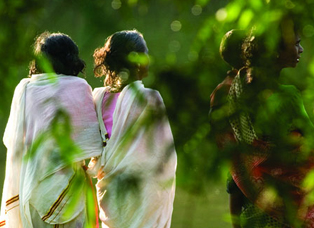
Upon arrival at Calicut International Airport, meet our office representative, followed by a transfer to Wayanad. Spread across 2,132 sq. km in the lofty Western Ghats, Wayanad is one of the few districts in Kerala that has retained its pristine nature. Check in at plantation resort, After the Rains. The resort is set on a 16-acre spice garden in the Western Ghats mountain ranges of the Nilgiri Biosphere and offers ethnic yet chic accommodation options with earthy, local experiences.In the evening, explore the property and meet people from the local community. The community surrounding Wayanad mainly consists of the “Paniya,” “Nayker,” “Kurumba,” and “Moopan” tribes. They are primarily daily-wage earners, plantation workers, or forest guards. Many are talented singers who perform local folklore, while others play instruments such as the thudi, chenda, thapu, and cheeni. These communities depend on the forest and seasonal changes for their livelihood. The Paniya and Kurumba are historically working-class communities, whereas the Nayker and Moopan are traditionally hunters. Festivals form an integral part of their lifestyle, marking various occasions through thira (a performance in which the performer is believed to be possessed by a deity), pooja, dance, and music.Dinner and overnight stay at the hotel.
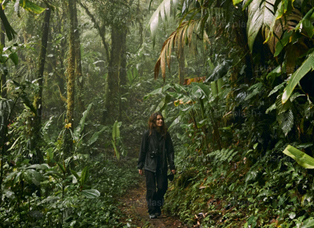
This morning, after breakfast, take a walk through the 16-acre plantation to discover the vibrant life and natural aura surrounding the area. The walk begins with a brief introduction to the demography, flora, and fauna of the region. After this orientation, you will be guided along an offbeat trail where you can observe various landscapes, crops, and ecological features of the land. The route leads to the forest boundaries and a beautiful stream that flows within the property, passing through fruit trees and offering fascinating encounters with local plant and animal life. Throughout the walk, local stories about the land, its culture, and its history are narrated to enrich the experience. By the end of the activity, participants will have discovered a sustainable ecosystem where humans and wildlife coexist harmoniously.Spend the remainder of the day exploring on your own. In the late afternoon, experience a local village walk named “Ente Uru,” meaning “My Village.” The walk takes you through a variety of plantations, tribal settlements, and country roads, providing an adventurous journey into the local life, labor, flora, and fauna of the surrounding villages. Your guide, Chandran, is well-versed in the local demography and, as he describes himself, is an “expert by experience” in the wild and plant life of the nearby forests. A member of the local community, Chandran is also an active member of the After the Rains plantation team and serves as a forest watcher during the peak summer months. The tour covers an area of about 5 to 6 km and begins with a brief introduction to the locality. As you walk, you will learn fascinating facts about lemongrass, eucalyptus trees, areca nut processing, tea plucking, and much more. Chandran, a sincere storyteller, will captivate you with tales of local culture, traditions, and the way of life in the area.Overnight stay at the hotel.
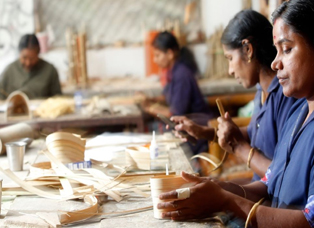
This morning, take a tour of the Achoor Tea Factory, a state-of-the-art manufacturing facility and one of the largest tea factories in South India. Experience the tea production process on a guided factory tour, followed by a visit to the Tea Museum. The century-old, three-storied wooden tea factory, built in 1911, has been converted into the Tea Museum.Here, you can explore historical information and artefacts related to the global tea trade and history, view antique collections, and enjoy a tea-tasting session during your tour. Learn about different tea varieties, how they differ in flavor and quality, the best methods of preparation, and the proper techniques of tasting.In the afternoon, visit Uravu, a rural bamboo production unit established to promote and empower the local culture and community.Return to your hotel for dinner and an overnight stay.
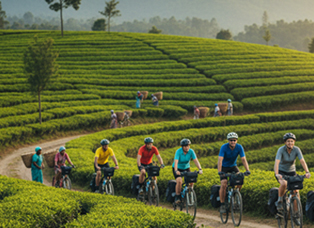
After breakfast, proceed to Kotagiri. En route, visit the Ooty Botanical Gardens. Designed by William Graham, this expansive garden covers 22 hectares and is known for its exotic and rare species of flora. Continue your drive to Kotagiri, located at an altitude of 5,885 feet above sea level and known for its healthy climate. It is the oldest and smallest of the three Nilgiri hill stations. Kotagiri is shielded by the Doddabetta Ranges, which receive most of their rainfall from the northwest monsoon. Upon arrival, check in at Sunshine Bungalow. Spend the evening at leisure—take a walk or enjoy a bicycle ride through the plantations. Dinner and overnight stay at the hotel.
Enjoy a tea plantation walk in the morning. After breakfast, visit the neighbouring hill station of Coonoor, the second-largest town in the Nilgiri Hills after Ooty. Visit Sim’s Park, spread over an area of 12 hectares, which houses a collection of more than 1,000 plant species. The botanical garden, partly developed in the Japanese style, derives its name from J. D. Sim, the secretary of the Madras Club in 1874. One of the key attractions of the park is the annual Fruit and Vegetable Show, held in May. Dolphin’s Nose Viewpoint, located about 10 km from Coonoor, offers a panoramic view of the vast expanse of the Nilgiri Hills and Catherine Falls. Visitors can also trek from Lady Canning’s Seat to Dolphin’s Nose. Return to Sunshine Bungalow. Spend the afternoon exploring on your own. Dinner and overnight stay at the hotel.
After breakfast, proceed to Pollachi and step into the rich heritage of Tamil Nadu. Pollachi was originally known as “Pozhilvaichi,” meaning “the land of natural wealth and prosperity.” You will then be directed to your farmhouse, The Banyan Tree, nestled within a 210-acre farm at the foothills of the Anamalais. The Banyan Tree Farm Stay offers the quaint charm of life in the hinterlands of South India. Experience the cultural tapestry and heritage of rural Tamil Nadu while enjoying the pristine air and lush greenery. In the evening, explore the charming surrounding villages and experience a bullock-cart ride through the farms. Later, engage in an evening conversation with your host, followed by dinner and an overnight stay at the hotel.
After an early breakfast, spend the day at the Parambikulam Tiger Reserve. Begin your visit with a canter safari through the forest reserve — a 53 km journey through the heart of the reserve that takes approximately three hours to complete. A naturalist will accompany the safari vehicle and interpret the landscape en route, followed by an exciting bamboo rafting experience on the Parambikulam Reservoir.Afterward, visitors will be provided lunch at Kannimara Café, followed by a trek along the Elephant Song Trail—a soft trek designed to offer a first-hand experience of walking through the forest. Part of the trail passes through the Kariyanshola Evergreen Forest, which forms a section of the Western Ghats UNESCO World Heritage Site, and the trek is accompanied by two trained naturalists.Members of the local tribal communities are employed in the organization and facilitation of activities within the tiger reserve. All earnings from these activities are reinvested to compensate the community members and to support conservation and upgradation of the reserve. Attractions along the tour include the Thunakkadavu Dam, Kannimara Teak, Dam View Point, Valley View Point, Parambikulam Dam, Tribal Heritage Centre, and Eco Shops at Parambikulam.Return to The Banyan Tree for dinner and an overnight stay.
After breakfast, proceed to Rajakkad Estate. Pallam Palace, located at the heart of the old Rajakkad plantation, is a small garden hotel featuring seven unique bedrooms housed within an 18th-century wooden structure that beautifully reflects its rich architectural heritage. Situated at an altitude of 1,000 meters above sea level, in the foothills of the Western Ghats, Rajakkad Estate offers a profound sense of serenity and tranquillity. Life here has changed very little over the past century.Check in to your room and enjoy the evening at the estate. Dinner and overnight stay at the hotel.
Spend the day exploring Rajakkad Estate. Days here can be spent relaxing beneath the shade of the garden trees in a hammock, reading, birdwatching, or wandering along the estate paths. You may also visit the farm, with its animals and coffee-drying yard.The hill-country climate brings a gentle warmth, and at this elevation, the air at Rajakkad is both refreshing and balanced. Enjoy a guided walk or a river walk through rocky gorges beneath the forest canopy; over escarpments of craggy pink granite with panoramic views; through coffee plantations; and into the surrounding hills, where waterfalls and secluded pools offer a glimpse of undisturbed peace. The surrounding villages—lively and engaging—come to life in the coolness of late afternoon, bustling with the activities of the temples and the business of local trade. During the season, auctions of coffee, lemons, citrons, pepper, and bananas take place. Dinner and overnight stay at the hotel.
After breakfast, drive to Thekkady. Check in to your plantation bungalow, Mystic Mayapott - a traditionally built retreat that gleams in warm hues amid the cardamom plantations. A trail through the rocks runs alongside a beautiful stream, leading to this marvel of architecture. In the afternoon, experience a plantation walk and witness the cardamom processing unit and the harvesting of cardamom seeds directly at the site. Observe the various stages of processing, including harvesting ripe capsules, both natural and machine-based drying methods, post-harvest processing, and storage—all while enjoying one of the finest forest stays in Kerala. Dinner and overnight stay at the bungalow.
After breakfast, proceed to Alleppey. By noon, board your traditional houseboat to explore and enjoy the beauty of rural village life and the backwaters - an area full of canals, lakes, and coves. A delicious traditional Kerala lunch will be served during the cruise. The population’s entire life unfolds on the water: people sail, fish, swim, and bathe here. They do their laundry and washing up in the water. They are so accustomed to this environment that one can often see people conversing for hours while standing neck-deep in water. Peddlers provide supplies, and public transport also operates on the water. Countless water birds wait for an opportunity to catch fish. The journey passes through a magnificent region of lush green vegetation in Kerala’s backwaters. Dinner and overnight stay will be on board.
After breakfast, disembark at Alleppey and visit a coir-making unit. Coir fibre is extracted from the fibrous outer layer of the coconut palm fruit, with or without retting. The fibre is graded based on its method of extraction, colour, the proportion of long and short fibres, and the presence of impurities. The coir manufacturing industry, which produces coir mats, matting, and other floor coverings, was established in India over a hundred years ago. The first factory was set up in Alleppey in 1859 by the late Mr James Darragh, an adventurous Irish-born American national. Continue driving to Cochin and check in at your resort . In the evening, explore the village on a bicycle ride. Enjoy dinner and an overnight stay.
After breakfast,visit to spice market and head out to explore the historic town of Fort Kochi. Begin at the Dutch Palace Museum, one of the finest examples of Kerala-style architecture interspersed with colonial influences. This double-storied palace houses an exquisite collection of murals. Stroll along Jew Street, which evokes a sense of nostalgia, and then visit the Jewish Synagogue, situated at one end of Jew Street in Jew Town. The synagogue was built in 1568 by the Cochin Jewish community.Take a tuk-tuk—the most popular mode of transport among the locals—and continue your tour with a stop at Dhobi Khana (the laundry station). Once bustling with activity, it now stands as a picture of gradual decline. Continue your visit to St. Francis Church, the oldest European church in India, and finally to the famous Chinese fishing nets of Cochin. A hallmark of Fort Kochi, these nets—locally known as Cheena vala—dot the Fort Kochi beach and nearby areas. The huge cantilevered structures are a legacy of early visitors to the Malabar Coast, believed to have been erected between 1350 and 1450 AD by traders from the court of Kublai Khan.In the afternoon, return to resort and relax by the backwaters. Overnight stay at the hotel.
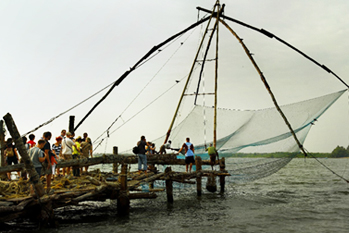
After breakfast, transfer to Cochin International Airport for departure, according to your flight schedule.
TRIP HIGHLIGHTS
Gateway of Spices
Lush Green Hills
Misty Tea Valleys
Serene Countryside Charm
Countryside Bliss
Hidden Mountain Haven
Coastal Heritage


